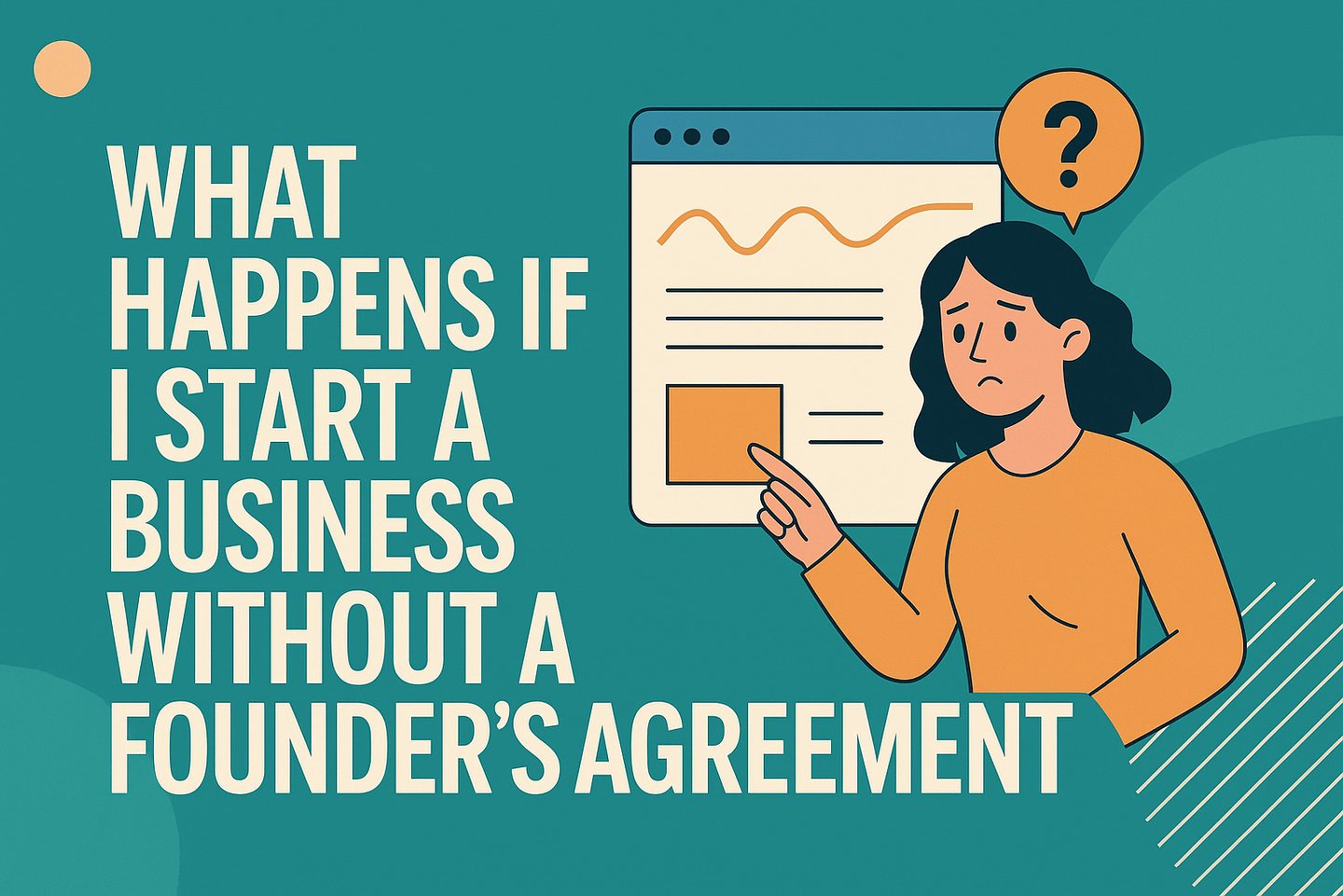What happens if I start a Business Without a Founder's Agreement
A founder's agreement involves the terms of the partnership, ownership stakes, roles and responsibilities. In this article, we will explore the potential consequences of starting a business without a founder's agreement.
CORPORATE LAWS
Deepika
7/14/20254 min read


Starting a business with a co-founder, it is easy to get involved in the excitement of launching a new venture. Without a formal agreement, it can lead to future risks, ownership stakes, and disputes, which can be a failure of business success. Founders' agreement is crucial in terms of partnership, ownership, roles, and responsibilities. In this article, we will explore the consequences of starting a business without a founder’s agreement.
Potential Consequences of Not Having a Founder's Agreement
Without a founder's agreement, the partnership can have risks of several consequences, including:
1. Disputes Over Ownership: Without a clear definition of ownership stakes, disputes can arise over equity and voting rights.
2. Unclear Roles and Responsibilities: Without a clear outline of roles and responsibilities, confusion and overlapping work can occur, leading to inefficiencies and conflicts.
3. Decision-Making Challenges: Without a clear decision-making process, disagreements can arise, and important decisions may be delayed or blocked.
4. Exit Strategies: Without a clear escape plan, co-founders may not know how to leave the business or what their obligations are, leading to potential disputes.
5. Intellectual Property Issues: Without a clear definition of intellectual property ownership, disputes can arise over patents, trademarks, and copyrights.
Real-Life Examples of Disputes Without a Founder's Agreement
There are several high-profile examples of businesses that have suffered due to the lack of a founder's agreement. For instance: Facebook vs. Winklevoss Twins: The dispute between Mark Zuckerberg and the Winklevoss twins over the idea for Facebook highlights the importance of having a clear agreement in place.
Benefits of Having a Founder's Agreement
The contents of the co-founders’ agreement are based on understanding arrived at by the founders. However, certain standard clauses are necessary in such agreements.
Nature and type of business entity: The co-founder’s agreement should clearly define the nature and the type of entity for incorporation in the long term. The business clarifies the business, long-term plan, roles, and responsibilities.
Assigning Roles and Responsibilities: If all the founders have the same or overlapping roles in the business. Therefore, it is particularly important to clearly define roles and responsibilities for each founder depending on their area of expertise and interest. For example, roles can be divided into operations, marketing, Finance, and so on. Clear demarcation of roles also develops a system of accountability where it would be easier to find the specific responsibility for a particular task that is supposed to be performed by a particular founder in a specific way.
Ownership Structure: The founders' agreement should clearly define the structure of ownership of the startup. This includes the percentage or number of equity shares held by each founder in the case of a company or the percentage of contribution to be infused by each founder. It can be based on the founder’s involvement in the startup. It is important to be clear about this provision in the first stage itself to avoid any potential future risks and conflicts among the founders.
Decisions: A useful tool for resolving conflicts is to set up a decision-making procedure. For example, if a voting system is adopted, it should be clarified. There can be business decisions that may not call for decision-making through voting.
Compensation: The agreement should include the scheme of compensation—which founder should get how much, and how will the amount be figured out?
Assignment of IPR: IP can add a boost to the valuation of a company and is an unbelievable asset. As a startup grows, it makes the intellectual property, which should be protected. IPRs should be assigned to the company and not to any person. This holds for the founders as well as the employees of the company.
Removal of a Founder: This clause lists the circumstances under which a founder can be removed from the company.
Confidentiality: Including a confidentiality clause in the co-founders’ agreement places an obligation on the founders to secure sensitive business data. It should be written about any such information that the company looks to protect.
Having a founder's agreement in place can provide several benefits, including:
1. Clarity and Certainty: A founder's agreement provides clarity and certainty over ownership stakes, roles and responsibilities, and withdrawal plans.
2. Protection of Interests: A founder's agreement protects the interests of all co-founders, ensuring that everyone is on the same page.
3. Prevention of Disputes: A founder's agreement can prevent disputes by outlining clear expectations and guidelines.
4. Attracting Investors: A founder's agreement can make the business more attractive to investors, proving a clear understanding of the partnership and its terms.
Key Provisions to Include in a Founder's Agreement
When drafting a founder's agreement, several key provisions should be included, such as:
1. Ownership Stakes: Clearly define the ownership stakes of each co-founder, including equity and voting rights.
2. Roles and Responsibilities: Outline the roles and responsibilities of each co-founder, including their duties and expectations.
3. Decision-Making Processes: Establish a decision-making process that outlines how decisions will be made, including voting requirements and dispute resolution mechanisms.
4. Exit Strategies: Define the exit strategies for co-founders, including buyout provisions, termination clauses, and intellectual property ownership.
In conclusion, starting a business without a founder's agreement can lead to potential consequences, including disputes, misunderstandings, future conflicts, and even the downfall of the business. A founder's agreement is a crucial document that outlines the terms of the partnership, providing clarity and certainty over ownership stakes, roles and responsibilities, and exit strategies of the business. By having a founder's agreement in place, co-founders can protect their interests, prevent disputes, and ensure the success and stability of the business.
